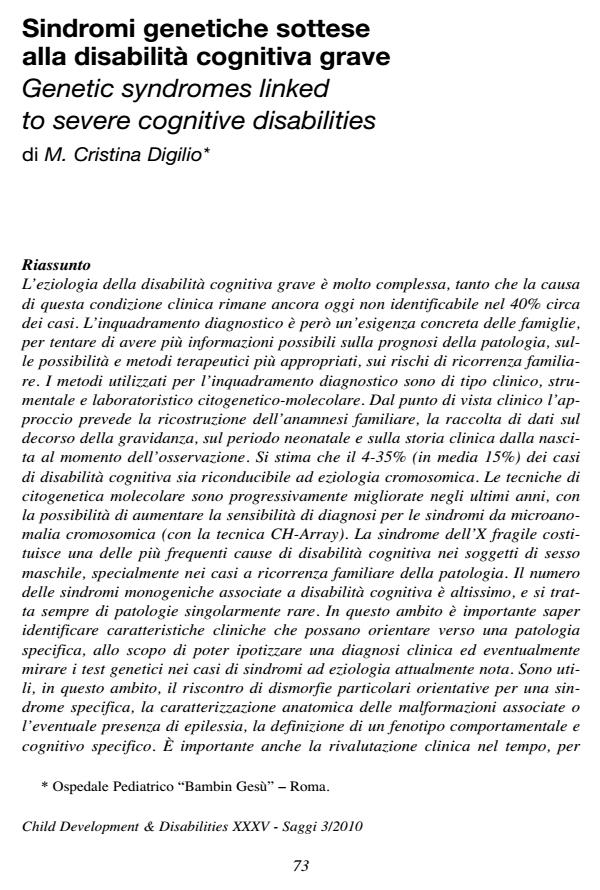Genetic syndromes linked to severe cognitive disabilities
Journal title CHILD DEVELOPMENT & DISABILITIES - SAGGI
Author/s M. Cristina Digilio
Publishing Year 2012 Issue 2010/3
Language Italian Pages 6 P. 73-78 File size 53 KB
DOI 10.3280/CDD2010-003012
DOI is like a bar code for intellectual property: to have more infomation
click here
Below, you can see the article first page
If you want to buy this article in PDF format, you can do it, following the instructions to buy download credits

FrancoAngeli is member of Publishers International Linking Association, Inc (PILA), a not-for-profit association which run the CrossRef service enabling links to and from online scholarly content.
The etiology of severe cognitive disability is quite complex, so that the cause of this clinical condition still remains unidentified in about 40% of cases. The diagnostic framing is however a real need for families, in order to have any useful information for the prognosis of the disease, the possibilities and the most appropriate treatment methods, the risk of familial recurrence. Methods used for diagnostic analysis are clinical, instrumental and of molecular-cytogenetic laboratory. From the clinical point of view, the approach involves the reconstruction of the family history, the collection of data on the course of pregnancy, the neonatal period and the clinical history from birth to the time of observation. About 4-35% (on average 15%) of cases of cognitive disabilities are due to chromosomal etiology. The molecular cytogenetic techniques have progressively improved in recent years, with the possibility of increasing the accuracy of diagnoses for chromosomal microanomalia syndromes (CH-Array technique). Fragile X syndrome is one of the most frequent causes of cognitive disabilities in males, especially in cases of familial occurrence of this disease. The number of monogenic syndromes associated with cognitive disabilities is remarkably high, and they are always rare diseases. In this context, it is essential to identify clinical features that may lead to a specific pathology, in order to provide a clinical diagnosis and possibly target genetic testing in cases of syndromes with currently known etiology. In this context, we consider useful the detection of some dysmorphic disorders as a guidance of a specific syndrome, the anatomical description of the associated malformations or the possible presence of epilepsy, the definition of a specific cognitive and behavioral phenotype. Moreover it is extremely important the clinical reassessment over time for signs of diagnostic significance that may occur at different ages in the life of a child.
Keywords: Cognitive disability, etiological diagnosis, genetic syndromes, molecular cytogenetics
M. Cristina Digilio, Sindromi genetiche sottese alla disabilità cognitiva grave in "CHILD DEVELOPMENT & DISABILITIES - SAGGI" 3/2010, pp 73-78, DOI: 10.3280/CDD2010-003012